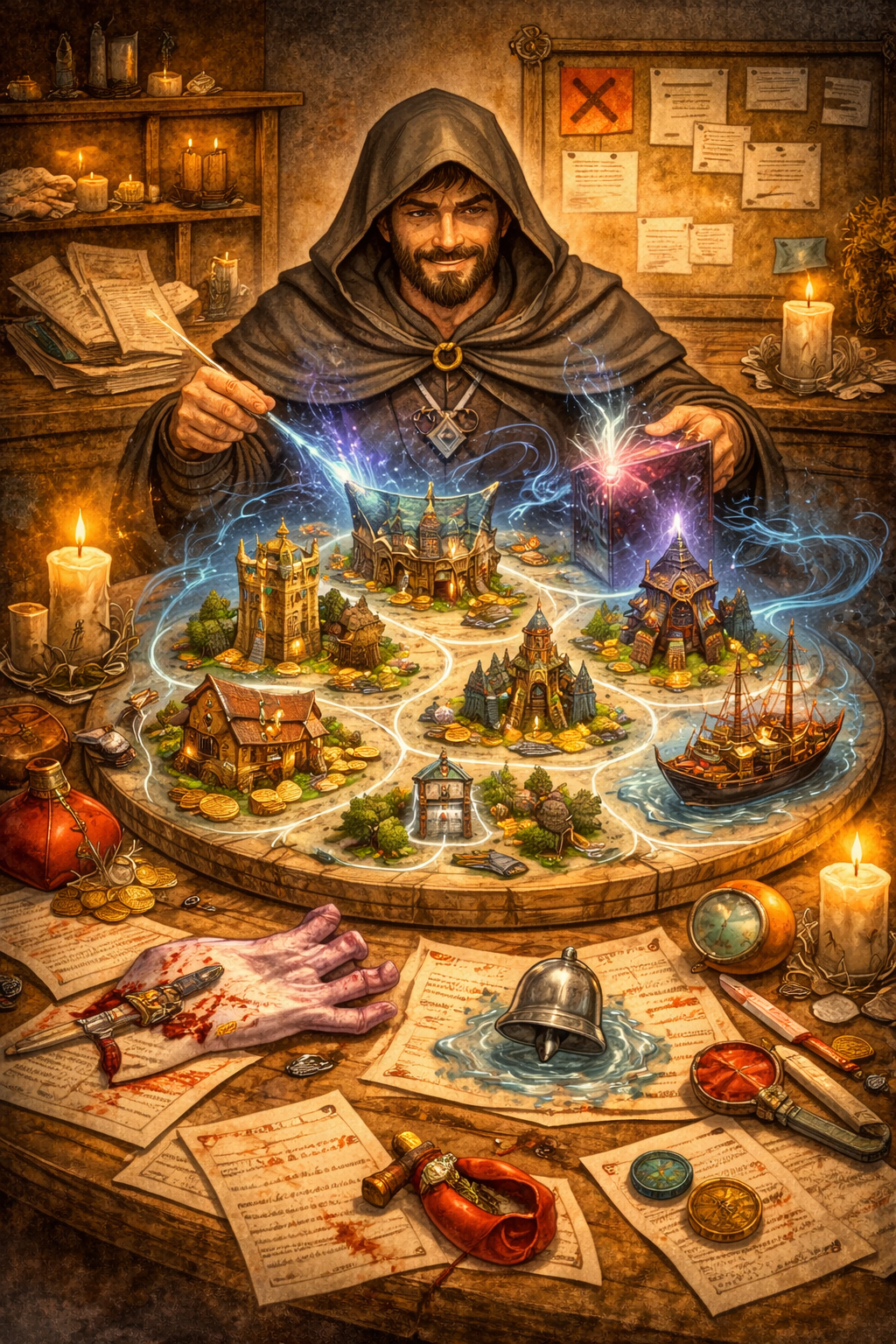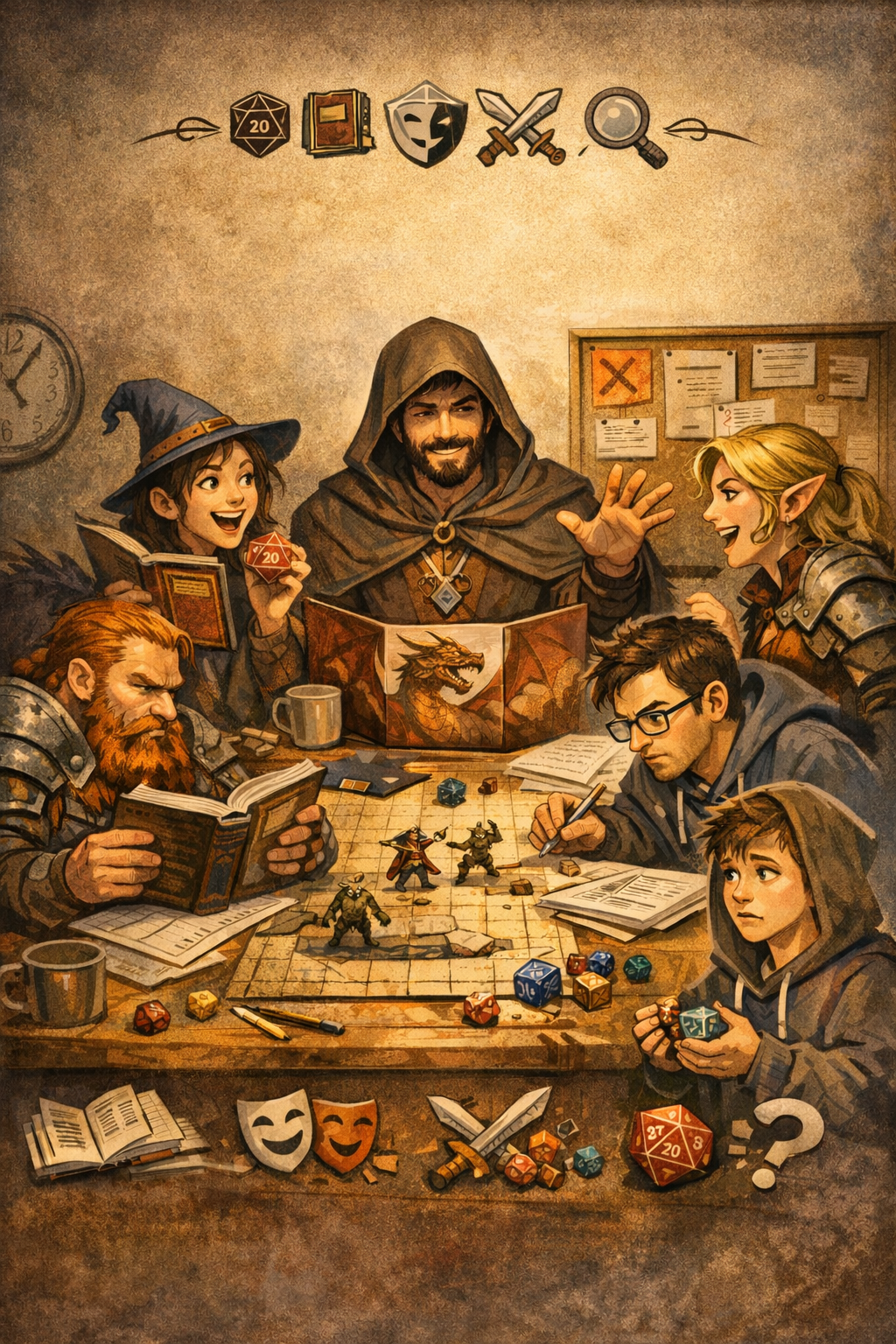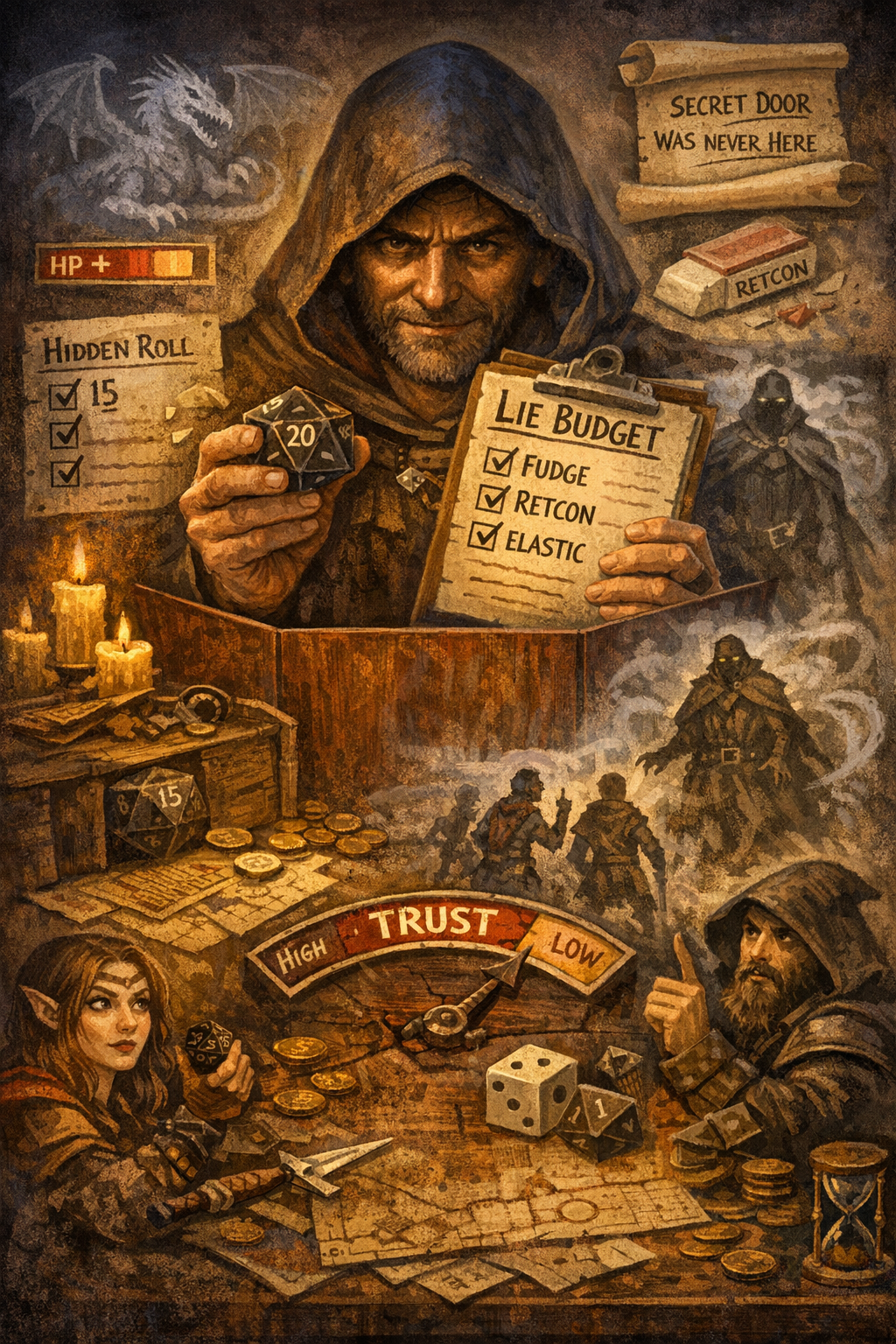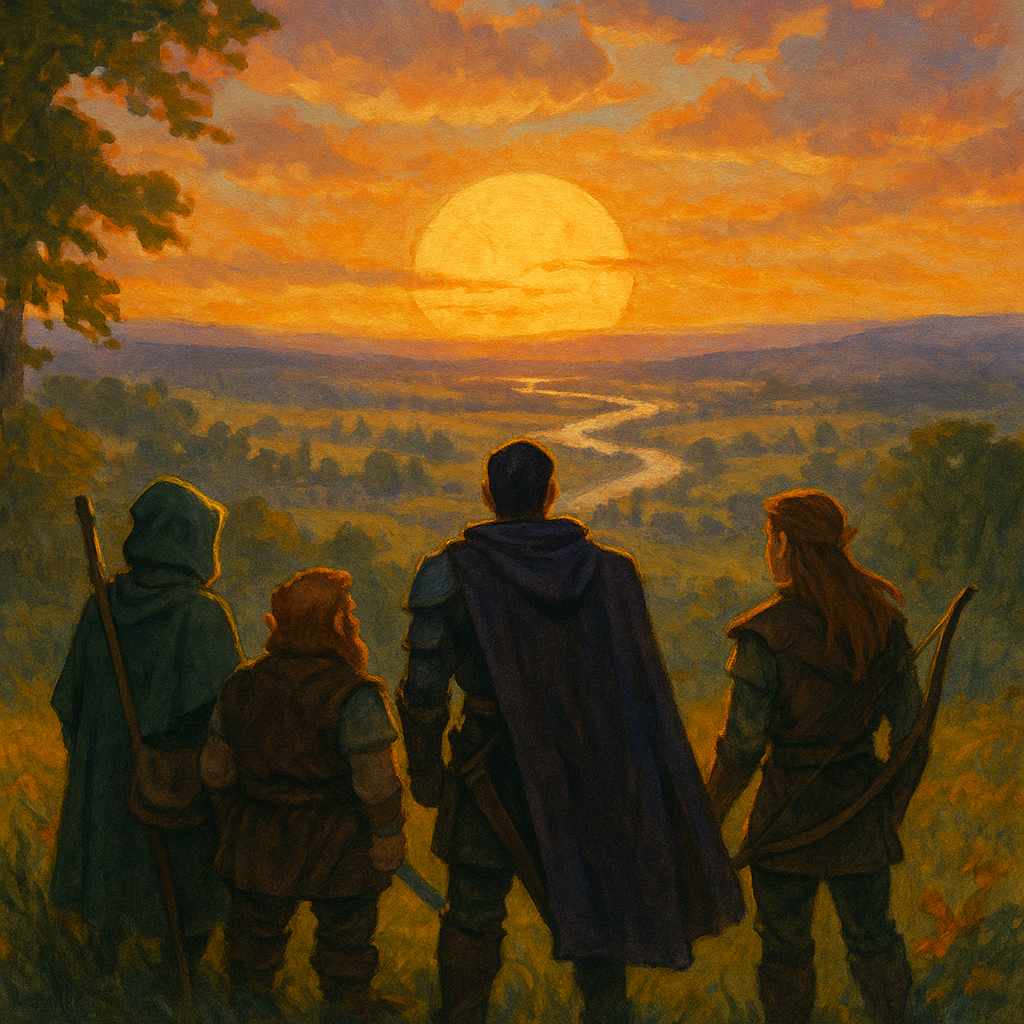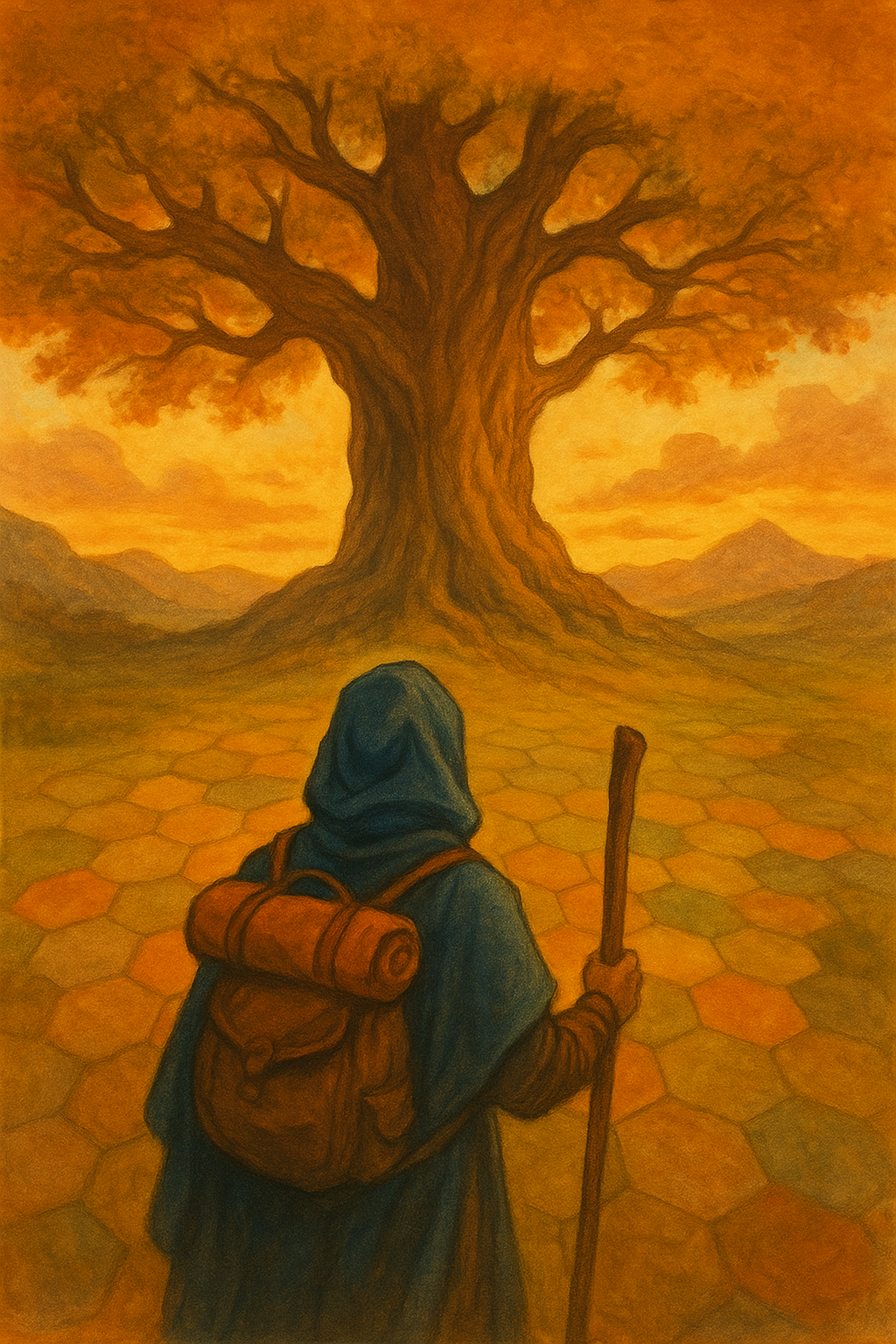How-To: Your Beginner's Guide to DMing
Let's learn how to DM!

Dear Readers,
Welcome to the wondrous world of Dungeon Mastering! If you've landed here, you're likely on the cusp of running your first game of Dungeons & Dragons (D&D), and you’re in for an adventure as thrilling as the ones your players will embark on. Whether you're wrangling goblins, unleashing ancient dragons, or simply guiding your friends through a quaint fantasy village, being a Dungeon Master (DM) is one of the most rewarding roles in tabletop gaming.
Starting out as a beginner DM can feel daunting, but it’s also incredibly exciting. With some preparation, the right mindset, and a few helpful tips, you’ll be crafting stories, building worlds, and, most importantly, creating unforgettable memories with your friends. In this guide, we’ll break down the key elements you need to succeed as a new DM, covering everything from storytelling and preparation to handling the unexpected. By the end, you’ll be equipped to step confidently behind the screen and lead your players on their first D&D journey.
Table of Contents
- Understanding Your Role as the DM
- Preparing Your First Session
- Creating a Compelling Story
- Guiding Your Players Through the Rules
- Learning to Improvise
- Keeping Players Engaged
- Managing Pacing and Combat
- Handling Challenges and Difficult Situations
- Building Your Confidence as a DM
- Final Thoughts and Encouragement
1. Understanding Your Role as the DM
As a Dungeon Master, you’re not just the person behind the screen; you’re the world-builder, storyteller, and sometimes even referee. Your job is to weave the tapestry of the game world and guide your players through it while allowing them to make their own choices and shape their own destinies.
Your main responsibilities include:
- Setting the Scene: Describing the world, scenes, and characters your players encounter.
- Presenting Challenges: Designing puzzles, obstacles, and encounters that push your players to think and collaborate.
- Mediating Rules: While you don’t need to be a rules lawyer, having a good grasp of core mechanics is essential to keep the game flowing smoothly.
- Reacting to Player Choices: No game will go exactly as planned, so be ready to think on your feet and adapt to player decisions.
Being a DM is about providing the framework for an adventure rather than controlling it outright. It’s a shared story between you and your players, and embracing that mindset is key to enjoying your time behind the screen.
2. Preparing Your First Session
Before jumping into your first session, take some time to familiarize yourself with the essentials. Preparation doesn’t mean knowing everything or memorizing the rules, but there are a few key steps that will help you run a smooth game.
Choose an Adventure Module (or Make Your Own)
If you're new, consider starting with a pre-written adventure like The Lost Mine of Phandelver, included in the D&D Starter Set. Modules provide a structured story and encounters, helping you focus on learning the flow of the game without creating everything from scratch.
If you prefer to create your own adventure, start small. Think of a short quest, like exploring a haunted mansion or rescuing a kidnapped villager. This keeps your story manageable and allows you to focus on core storytelling and combat.
Read the Rules, but Don’t Worry About Perfection
Get comfortable with the basics, such as combat, skill checks, and saving throws. You don’t need to memorize the entire Player's Handbook or Dungeon Master's Guide, but knowing the core mechanics will help you improvise and keep the game moving.
Plan Your NPCs and Key Scenes
If you're using a module, it will have many NPCs (Non-Player Characters) and story beats planned for you. However, if you’re creating your own story, sketch out some NPC personalities, motives, and a few important scenes. This doesn’t have to be complicated—just enough so that you feel prepared if the players decide to interact with them.
3. Creating a Compelling Story
A good D&D story is about more than just epic battles; it’s about giving players choices and the chance to impact the world around them. Here are some tips for crafting an engaging narrative:
Start with a Hook
A strong hook will draw players into the world. Whether it’s a strange rumor, a sudden event, or an NPC asking for help, make it something that catches their attention. Keep it simple and intriguing, allowing your players to wonder, “What’s going on here?”
Give Players Agency
A compelling story allows players to make meaningful decisions. Instead of forcing them down a single path, present them with options, each with different consequences. Maybe they can choose to ally with a local lord or take up arms against him. Let their choices matter and shape the narrative.
Balance High Stakes with Personal Stakes
While saving the kingdom is exciting, personal stakes often resonate more with players. Try weaving in NPCs that the players care about or quests that align with their backstories. This adds emotional depth and makes victories feel even sweeter.
4. Guiding Your Players Through the Rules
One of the DM’s most important roles is to help players understand the game mechanics. Here are some ways to make the rules accessible without overwhelming yourself or your players:
Simplify Where You Can
If a rule is too complicated or slows down the game, feel free to simplify it. For example, instead of calculating precise travel times, round it off and move on. When in doubt, remember that the goal is fun and engagement, not rule perfection.
Focus on the Basics
As a new DM, concentrate on core mechanics—such as how combat rounds work, the difference between advantage and disadvantage, and basic skill checks. This foundational knowledge will cover most of what you need in early sessions, and you can learn more detailed rules over time.
Encourage Questions
Encourage players to ask questions, and don’t be afraid to look up rules mid-session if needed. No one expects you to know everything off the bat, and allowing for a bit of learning in-game helps everyone understand and appreciate the mechanics.
5. Learning to Improvise
No plan survives contact with the players. Improvisation is a core skill for DMs, as your players will inevitably throw curveballs your way.
Go with the Flow
Don’t panic if players ignore a planned quest or take unexpected actions. Instead, lean into it. If they decide to chase down a strange NPC instead of visiting the inn you prepared, let that NPC become part of the story. Adapting on the fly is an invaluable skill, and you’ll get better at it with practice.
Have a Few Random Encounters Ready
Random encounters are great for filling in unplanned moments. Keep a few simple encounters or interesting scenarios on hand, like a merchant with peculiar wares or a small bandit ambush. These can serve as filler or even inspire new storylines based on how players react.
Remember the “Yes, and…”
A popular improvisation technique, “Yes, and…” is a helpful mindset for responding to player ideas. Rather than saying “no” to creative ideas, try “yes, and…” to build on their suggestions and steer them in engaging directions.
6. Keeping Players Engaged
D&D is a group game, and a DM’s job is to ensure that everyone is involved and engaged. Here are some tips to keep things interesting for the whole table.
Balance Roleplay, Exploration, and Combat
Each player has a different play style, so try to include a mix of roleplay, exploration, and combat in each session. By providing varied experiences, you’ll keep everyone invested and engaged.
Involve Every Player
During the session, make sure every player has a chance to contribute. If one player has been quiet, try prompting them by asking their character’s opinion on a decision or giving them a moment to shine in combat. Encouraging participation helps everyone feel valued and keeps energy levels high.
Use Descriptive Language
Descriptive language enhances the atmosphere. Instead of saying, “You see a dragon,” describe it as, “A massive, green-scaled dragon unfurls its wings, its eyes glinting like emeralds in the firelight.” These little details can immerse players in the world, making the game more engaging and memorable.
7. Managing Pacing and Combat
Pacing can be tricky in D&D, especially for new DMs. Here’s how to maintain a smooth flow without getting bogged down.
Set the Tone for Combat
Combat can slow down if each round drags on too long. To maintain pace, encourage players to think about their moves ahead of time, and keep your own notes organized. During longer combats, inject excitement with descriptions of the action, and make sure players are focused and involved.
Know When to Move On
If players seem stuck in a particular scene or overthinking a problem, help move things along by offering subtle hints or cutting to the next scene. This keeps the story moving forward and prevents the game from stalling.
8. Handling Challenges and Difficult Situations
From interpersonal conflicts to unforeseen rule issues, challenges can arise during any campaign. Here’s how to navigate them.
Manage Table Dynamics
A good DM fosters a welcoming and inclusive table. Be mindful of each player’s comfort level, and don’t be afraid to have open discussions about boundaries and expectations.
Use Session Zeros
Before the campaign begins, have a “Session Zero” to set the tone, discuss boundaries, and ensure everyone is on the same page. This is also a great time to talk about character backstories, preferences, and any special game rules.
Stay Calm Under Pressure
In the heat of the moment, players may disagree or debates over rules might arise. Remember that your role is to keep the game enjoyable. Make a ruling to move things along, and revisit the rule afterward if necessary. Keeping a level head helps everyone stay focused on the story rather than any momentary disputes.
9. Building Your Confidence as a DM
Confidence comes with practice, so give yourself room to make mistakes and learn along the way. Embrace the fact that you’re new to this and that everyone is there to have a good time.
Practice Descriptions and Voices
One way to build confidence is by practicing descriptions and NPC voices. You don’t have to be a professional voice actor, but adding variety to your NPCs’ voices and mannerisms can add depth and make you feel more in control of the story.
Trust Your Instincts
As the DM, trust that your instinctive choices are valid. It’s okay if your game doesn’t look exactly like the polished streams or campaigns you’ve seen online. Every DM has their unique style, and your players will appreciate your approach.
10. Final Thoughts and Encouragement
Remember that every DM started as a beginner, and learning comes from doing. Don’t be afraid to try new things, make mistakes, and grow along the way. Each session will teach you something new, and each campaign will build your skills and storytelling abilities.
Enjoy the process, trust your instincts, and most importantly, have fun. Your enthusiasm and dedication are what make the experience magical for your players. So grab your dice, gather your friends, and set forth into the world of adventure. You’re going to do great!
Until next time, Dear Readers...
















